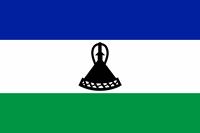Lesotho
Lesotho became independent from Britain on 4 October 1966 as a constitutional monarchy. The ruling Basotho National Party (BNP) appeared likely to lose Lesotho's first post-independence general elections in 1970, resulting in Prime Minister Leabua Jonathan annulling the election, refusing to hand over power to the Basotho Congress Party (BCP) and imprisoning its leadership.
The BNP ruled by decree until a military coup in January 1986. The Military Council granted executive powers to King Moshoeshoe II, who until then had been a ceremonial monarch. In 1990 the King was forced into exile after a falling out with the army. His son was installed as King Letsie III. The chairman of the military leadership was ousted in 1991 and replaced by Major General Phisoane Ramaema, who handed over power to a democratically elected government of the BCP in 1993.
In August 1994, Letsie III staged a coup which was backed by the military and deposed the BCP government. The new government did not receive full international recognition. After protracted negotiations, the BCP government was reinstated and King Letsie III abdicated in favor of his father in 1995, who died in 1996 and was again succeeded by his son, Letsie III.
The ruling BCP split over leadership disputes in 1997.Prime Minister Ntsu Mokhehle formed a new party, the Lesotho Congress for Democracy (LCD), and was followed by a majority of Members of Parliament, which enabled him to form a new government. The LCD won the general elections in 1998 under the leadership of Pakalitha Mosisili, who had succeeded Mokhehle as party leader. Despite the elections being pronounced free and fair by observers, opposition political parties rejected the results and violence ensued. The government requested a SADC task force to intervene to prevent a coup and restore stability. A military group of South African and Botswana troops entered the country in September, put down the mutiny, and withdrew in May 1999.
Consitutional reforms lead to peaceful parliamentary elections in 2002, but the National Assembly elections of February 2007 were hotly contested and aggrieved parties continue to dispute how the electoral law was applied to award proportional seats in the Assembly.
Lesotho has a mixed legal system of English common law and Roman-Dutch law.
Lesotho has a constitution dating from 1993.

